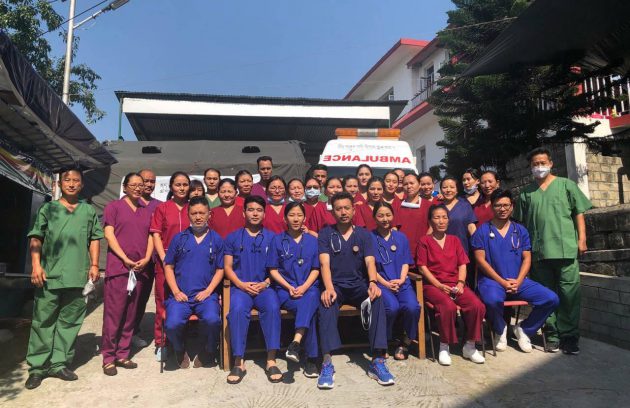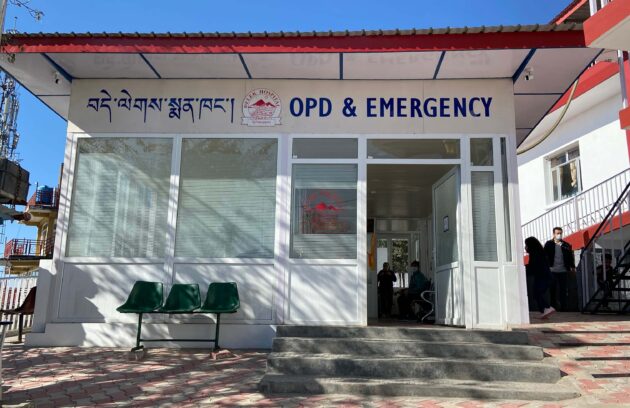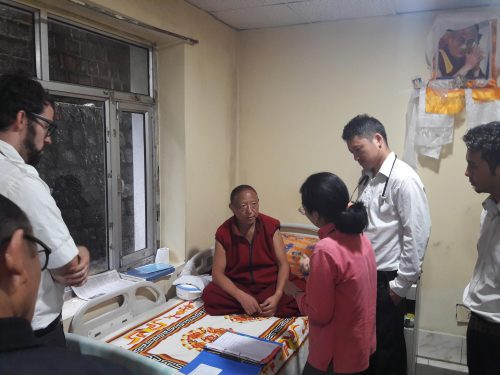Our Mission Statement
We, at the Delek Hospital, are committed to serving all who come to us, no matter what their race, religion, gender, or country of origin. We promise to treat all people in a compassionate and respectful manner, and we pledge to give the finest treatment, commensurate with our resources, regardless of the person’s social or financial status.
From the Administrator's Desk
Tibetan Delek Hospital has come a long way from its inception in 1971 with our present health services reflecting a well-balanced combination of both the curative and preventative aspects of health.
With blessings from His Holiness the Dalai Lama and support from the Central Tibetan Administration, the Indian government, and especially from our generous donors, Delek Hospital has witnessed immense progress and achieved many of its goals over 50 years, despite all the odds.
Registered as a charitable institution, Delek Hospital’s main goal has been not to turn away any patient and focusing particularly on helping poor and under-resourced patients. Our top priority is to provide the highest quality of care to patients with our available resources.
The hospitals finances are managed by two Accountants and audited each year by the Auditor General of the CTA. Detailed reports are sent to the donors in accordance with agreements reached between the funders at Delek.
The achievements of the Tibetan Delek Hospital over more than five decades, are all due to the blessings of His Holiness the XIV Dalai Lama, the generous support of donors and above all the hard work and dedication of staff.
Finally we, at Delek, would like to take this opportunity to thank all our generous donors, supporters and well wishers who have helped us all over years.
Establishment
Nestled along the north western foothills of the Himalayas, Tibetan Delek Hospital has been providing health care services in Dharamsala for over forty years. The visionary behind Tibetan Delek Hospital was Mr. Tsewang Rinchen Rishing who proposed the founding of an allopathic medical service to cope with the many health problems in our refugee community. With His Holiness the XIV Dalai Lama’s blessings, Tibetan Welfare Delek Hospital was officially inaugurated on October 4th, 1971. The hospital was formally handed over to the Central Tibetan Administration (CTA) on January 1, 1979, and renamed the Tibetan Delek Hospital.
Although distinctly autonomous in its administration and funding, the hospital falls under the auspices of the Department of Health, chief supervisor of all health care delivery among Tibetans in exile. The Tibetan Delek Hospital functions on income-generating projects in order to be more self-sufficient.
The hospital services are offered either at minimal rates or, in cases of genuine need, free of charge. Most of the hospital’s funding is provided by generous donations from dedicated supporters and contributors. Over the past 50 years, the hospital’s range of services has increased from a small dispensary to a multi-facility hospital with 33 patient beds.
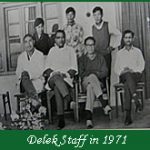
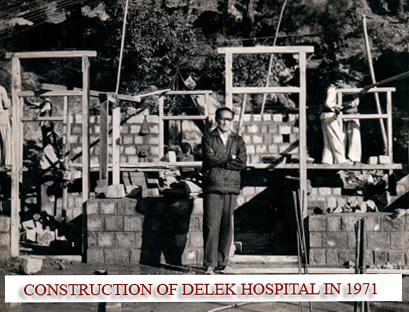
Tribute to the founder
Mr. Tsewang Rinchen Rishing (1914 – 1982)
Tsewang Rinchen Rishing was born in the Gyal Tsekyi-Khar region of Tibet.
Following in the footsteps of the Tibetan exodus from Communist China’s invasion of Tibet, Rishing sought refuge in Gangtok, the capital of Sikkim in 1962.
Eventually arriving in Dharamsala Mr. Rishing was twice appointed a Community Leader and became a member of the Third and Fourth Tibetan People’s Deputies in Dharamsala for two terms of three years. Following his close observation of the absence of any medical facilities, and the dire need for one among Tibetan refugees, Mr. Rishing presented a proposal to His Holiness the Dalai Lama for a modest plot of land with a small room or two for the purpose of an allopathic clinic. The proposal was well received by His Holiness with a suggestion that Mr. Rishing planned a much larger project, and the idea of an allopathic Hospital was born in Between the foundation stone being laid and completion of the construction, Mr. Rishing’s project was challenged by continued financial hurdles forcing him, at one stage, to leave his wife’s prized traditional Tibetan jewellery as collateral for loans. (Fortunately in time it was redeemed!) Finally, on the 4th October, 1971, the Tibetan Delek Hospital was officially named and inaugurated by His Holiness the XIV Dalai Lama, Patron of this first Tibetan allopathic hospital. Mr. Rishing administered the Hospital until the end of 1978, after which the Institution was handed over to the Central Tibetan Administration. On January 3, 1982, Tsewang Rinchen Rishing passed away at the age of 63. Today, we pay tribute to the man who saw a need in our community and committed himself to fulfilling that need. The vision of the founder is celebrated each year on Founder’s Day in his honor.

Board Of Directors :
Although Tibetan Delek Hospital is theoretically under the umbrella of the Central Tibetan Administration (CTA), in practice, the hospital functions as an autonomous institution. Delek’s overall administration is governed by a nine-member Board of Directors chaired by the Health Minister. Mr. Dawa Phunkyi, the current Administrator, manages the overall day-to-day functioning of the hospital.
Present Board Of Directors
Mr. Penpa Tsering | Health Minister (CTA) | Chairperson |
Mr. Jampa Phuntsok | Health Secretary (CTA) | Vice Chairperson |
Mr. Palden Dhondup | Home Secretary (CTA) | Member |
Mr. Thupten Tsering | Director, Tibetan Medical Centre | Member |
Mr. Sonam Sichoe | President , TCV School | Member |
Mr. Tsering Dhondup | Director , Sambhota Tibetan School Society | Member |
Mr. Kunchok Migmar | Settlement Officer, Dharamsala | Member |
Dr. Tsetan Dorji Sadutshang | Chief Medical Officer, Delek | Member |
Mr. Dawa Phunkyi | Chief Administrator, Delek | Executive Secretary
|
Delek for your service
Medical Center
The facilities at Delek are available to all who seek our services especially those who are poor.
Our hospital receives no grant from the Tibetan Government or from the Department of Health, of the Central Tibetan Administration (CTA). The hospital aims to be self reliant through income-generating projects and its nominal fees from patients who can afford to pay. The majority of the hospital’s funding, however, continues to be provided by generous donations from dedicated supporters and contributors worldwide.
- Qualified Staff of Doctors
- The In-Patient Service
- Out-Patients Service
- 24x7 Ambulance Service
Dedicated Services
Our Departments
Visiting Specialists from other hospitals
- 1Specialist Docotrs
Out-Patients Department (OPD)
- 1Specialist Docotrs
In Patient Service
- 1Specialist Docotrs
Pharmacy Department
- 1Specialist Docotrs
Why People Choose Us?
We offer extensive medical services for our patients recommend
that you use officia.
Our Mission Statement
We, at the Delek Hospital, are committed to serving all who come to us, no matter what their race, religion, gender, or country of origin. We promise to treat all people in a compassionate and respectful manner, and we pledge to give the finest treatment, commensurate with our resources, regardless of the person’s social or financial status.
Information related to the medical student
The hospital would like to give you some information that may be of interest to you as a medical student. The more you know and understand about our hospital, before you decide to come, the better it will be for all.
You are required to send your CV and a reference letter from your present University. Also, an administrative/ elective fee of US $100 per month must be sent in advance by bank transfer to:
Bank details:
Bank: UCO Bank
Account Holder: Tibetan Delek Hospital
Account No: 20590100001309
IFSC No: UCBA0002059
GangchenKyishong
Dharamshala – 176215
Distt Kangra – H.P.
The cancellation of the visit must be notified to Mrs. Sangay, the hospital’s elective coordinator, at least two months before your joining date. However, the monthly fee will not be refundable.
NB: The above information gives priority to Registered Medical Students already on courses. Pre-Registration medical students will only be allowed if space permits.
Tibetan pre-medical or medical students: will be offered placements without making an advance booking, but the student will be subject to completion of hospital formalities by sending us his/her CV and reference before their arrival. They are now required to pay a clinical elective fee of US$ 100/- per month. Failing to meet these requirements may endanger their placement with us.
Do you want more information?
If you are genuinely interested in participating at the Delek Hospital as a medical student, you can send an e-mail to: sponsorshipdelek(at)gmail(dot)com and we will send you additional information.
HOW YOU CAN HELP DELEK
TB Control Project
Fund for TB Patient’s Supplementary Diets
General Fund
Corpus Fund
Continuing Medical Education programme
Medical Equipment
Hospital Renovation Project
Staff Salary
Pension for Delek’s Retired Staff
– DELEK HOSPITAL STAFF MEDICAL FUND
As a purely charitable hospital, if you would like to help Delek Hospital with financial, either as a one-off contribution or on a monthly standing order, we would be most grateful.
However, as the Indian rupee is not an international currency, please do not send international cheques/checks directly to our bank account, as these will be rejected by our bank here in India.
We have FRIENDS OF DELEK around the world who can collect donations and send them to us through the correct banking channels.
Please contact the following relevant officers:
Tibet Fund, US: Mr. Lhakpa Tsering lhakpa(at)tibetfund(dot)org
German Aid to Tibetans: Dr. Margarete Thaktsang: m.thaktsang-schall(at)gmx(dot)de
Or
Mr. Birgit Storz: storzbirgit(at)gmail(dot)com
Verein Tibetfreunde, Switzerland: Mr. Jigme Risur: jigme(at)bluewin(dot)ch
Tibetan Friendship group, Australia: Ms. Choekyi Tsewang: choekyi(at)y7mail(dot)com
Tibet House, UK: Ms. Tenzin Zeydhan: sec.uk(at)tibet(dot)net
BANK DETAILS
For donors within India :–
Bank Name – UCO Bank
A/c Holder – Tibetan Delek Hospital
A/c Number – 20590100001309
IFSC- UCBA0002059
Gangchen Kyishong
Dharamsala – 176215
Distt. – Kangra (H.P.)
For donors outside of India :–
Foreign Contribution Account
Bank Name – State Bank of India
Account No : 40033752681
Account Open Date : 25/02/2021
Branch Code : 00691
IFSC : SBIN0000691
SWIFT : SBININBB104
Address : FCRA Cell, 4th Floor, State Bank of India, New Delhi Main Branch 11, Sansad Marg, New Delhi-110001
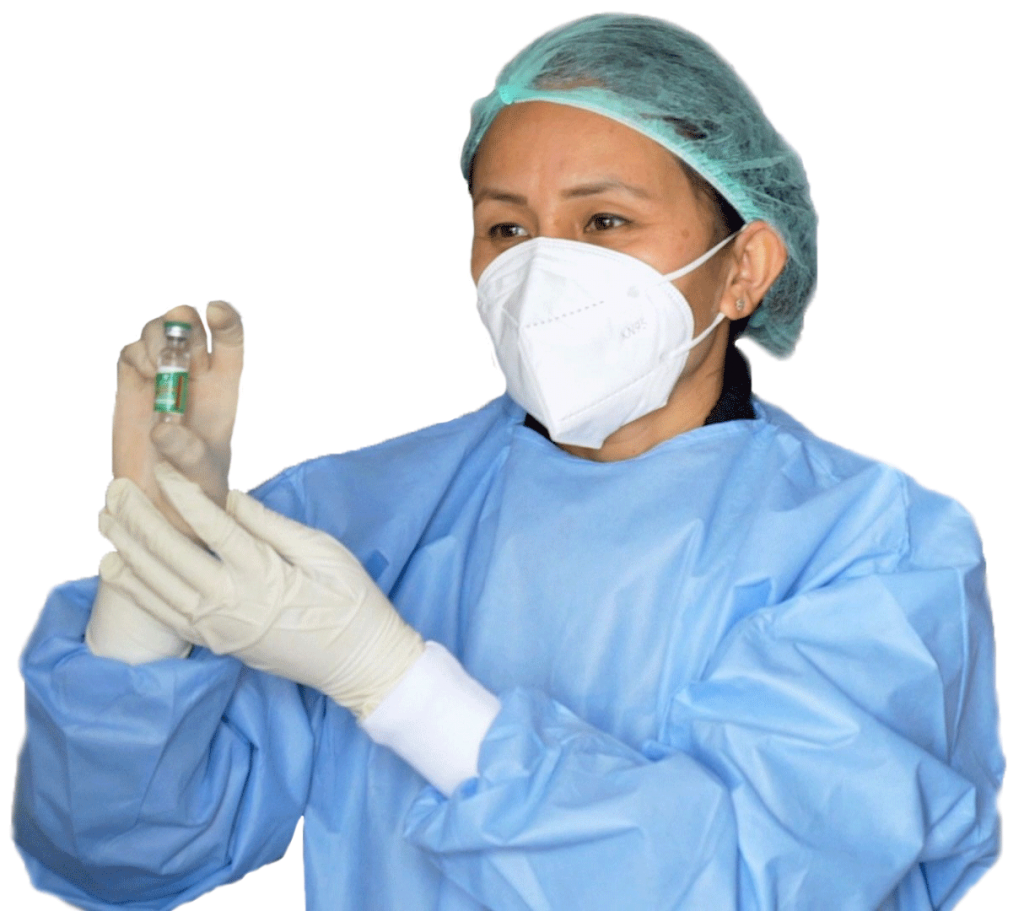

“The special thing about Delek is the culture. I call it Delek Culture. Delek is a very special place, but I don’t think it’s special only because of a few people…like because of the doctors, because of administration, because of sponsors. I think the culture of the hospital is special even without doctors—the nurses and staff are so dedicated, so compassionate. They will try their best to give you not only the medical care—they also give psychosocial, emotional, every possible care. Some of the patients have no attendant. No one in and around Dharamsala, so nurses will cook for them. If someone is not able to take solid food, they will make porridge. It is not asked by someone or told by someone or discussed during morning rounds. It is spontaneous.”
Dasel
Doctor

"I stayed here for a couple days. At night I walk around, and I see a lot of sick people here. There is a lot of sickness in the world these days. When I see people that are sick and suffering, I don’t really remember my own sickness. When I was sitting outside I was praying, but not once did I pray for my sickness to get better. I instead prayed for everybody here, for them to get better and for them to get better soon. Those were my prayers. What we really need are good doctors and good nurses and good health care workers."
Anonymous
Monk

“I think what’s really interesting is how early [the Tuberculosis Program] started when they were a refugee community. The hospital started in 1970 which was 10 years after they left Tibet. I think what’s been quite surprising to me is how quickly they did get organized and start setting things up, the way that they kind of saw what the priorities were, you know, so they knew they had a huge problem with TB and they knew that their community was very dispersed and they did not have too many staff. To me what’s interesting is how they were able to see the problem and how they were able to see different parts of the problem. They kind of thought it all out and tackled each problem.”
Mary Garvey
-

“At first, I had some fever and sweating at night. Sometimes I had a cough. I went to a government hospital for a check-up, and they gave me 5 months of Tuberculosis (TB) treatment. During that time, I had a pain over my left hip. One night, after waking up, I was not able to get up. I could not walk. The pain had gotten even worse. So then I heard about Delek Hospital, and that here, they treat TB well, so I came here.”
Anonymous
-

“If you are in medicine, you should be dealing with the patients right. A human-to-human connection should be there. So no matter what you are doing, whether you’re a nurse or a doctor or a lab tech, just be good to the patients, you know, have a sense of humanity. If there’s a problem, deal with them. Patients come here because they have some sort of suffering. If we have that in our minds, why patients come here, we should show them good gestures, approach them, be the first to initiate and make them comfortable. So when they come to the hospital they will say, “this hospital is very nice because everyone here is very caring, and they do so much.”
Nangsel
Nurse

“The nurses who worked the oncology ward in Ottawa, the nurses here, it’s the same compassion—that’s what I experience. Interestingly, I eventually developed friendships with my oncologists in Ottawa and I’ve known them for years now. I have a feeling that doctors at Delek—I don’t know this empirically—don’t have a problem, don’t feel the need to have that barrier that preserves their objectivity. That they’re more willing to enter the whole patient experience with empathy as well as maintaining objectivity. This is maybe BS, but this is my own intuitive appreciation between western medicine and this hospital.”
Anonymous
-

"So I think every day when we are interacting with people we try, first of all, not to segregate people, by race, culture, whatever. I think being Tibetan, and being Buddhist, you know, we have a lot of daily practice of being compassionate. Being patient with the patients, Delek’s setup kind of puts those principles into practice—not just meditation and doing the circumambulations, doing the mantras. I think we are physically doing and acting out compassion through our work and service. I’ve seen nurses who go out on a line to aid a patient, not just as a nurse but as a caregiver, a true caregiver. I’ve seen nurses bring food for patients form their home. That kind of thing rubs off on you—it makes you want to do something more than just being a doctor and prescribing medicines. Not everything about the cure, you know. It’s about healing and aiding."

